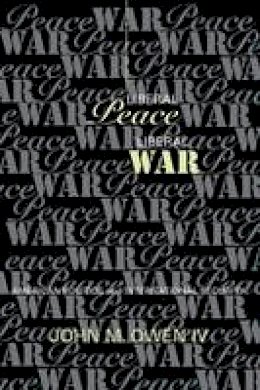7%OFF

Stock image for illustration purposes only - book cover, edition or condition may vary.
Liberal Peace, Liberal War: American Politics and International Security (Cornell Studies in Security Affairs)
John M. Owen
€ 38.99
€ 36.14
FREE Delivery in Ireland
Description for Liberal Peace, Liberal War: American Politics and International Security (Cornell Studies in Security Affairs)
Paperback. Series: Cornell Studies in Security Affairs. Num Pages: 264 pages, 5. BIC Classification: 1KBB; GTJ; JPA; JPHV; JPS. Category: (P) Professional & Vocational; (UP) Postgraduate, Research & Scholarly; (UU) Undergraduate. Dimension: 234 x 157 x 16. Weight in Grams: 376. American Politics and International Security. Series: Cornell Studies in Security Affairs. 224 pages, 5 tables. Cateogry: (P) Professional & Vocational; (UP) Postgraduate, Research & Scholarly; (UU) Undergraduate. BIC Classification: 1KBB; GTJ; JPA; JPHV; JPS. Dimension: 234 x 157 x 16. Weight: 372.
Liberal democracies very rarely fight wars against each other, even though they go to war just as often as other types of states do. John M. Owen IV attributes this peculiar restraint to a synergy between liberal ideology and the institutions that exist within these states. Liberal elites identify their interests with those of their counterparts in foreign states, Owen contends. Free discussion and regular competitive elections allow the agitations of the elites in liberal democracies to shape foreign policy, especially during crises, by influencing governmental decision makers. Several previous analysts have offered theories to explain liberal peace, but they have not examined the state. This book explores the chain of events linking peace with democracies. Owen emphasizes that peace is constructed by democratic ideas, and should be understood as a strong tendency built upon historically contingent perceptions and institutions. He tests his theory against ten cases drawn from over a century of U.S. diplomatic history, beginning with the Jay Treaty in 1794 and ending with the Spanish-American War in 1898. A world full of liberal democracies would not necessarily be peaceful. Were illiberal states to disappear, Owen asserts, liberal states would have difficulty identifying one another, and would have less reason to remain at peace.
Product Details
Publisher
Cornell University Press
Number of pages
224
Format
Paperback
Publication date
2000
Series
Cornell Studies in Security Affairs
Condition
New
Weight
375g
Number of Pages
264
Place of Publication
Ithaca, United States
ISBN
9780801486906
SKU
V9780801486906
Shipping Time
Usually ships in 7 to 11 working days
Ref
99-1
Reviews for Liberal Peace, Liberal War: American Politics and International Security (Cornell Studies in Security Affairs)
John Owen's Liberal Peace, Liberal War is the best empirical test of the effects of liberal principles and representative institutions on war and peace yet to be produced. Painstaking in its attention to the historical record, insightful in its treatment of theoretical disputes, and provocative in its conclusions, this study is a must-read for the 'democratic peace debate.' For students of international relations it not only illustrates the powerful effects of perceptions on policy, it is a model for how to conduct systematic case study research. -Michael W. Doyle, Director of the Center of International Studies at Princeton Universty and author of Ways of War and Peace Liberal Peace is a noteworthy and original addition to the small but growing number of books. . . on the apparent absence of war between democratic states. . . Owen's work provides strong evidence that liberalism exerts significant influence on the crisis behavior of liberal states. It should stimulate further research on the influence of liberal ideas and institutions on foreign policy more generally. -Sean M. Lynn-Jones, Harvard University. American Political Science Review, Vol. 94, No. 4. December 2000 Contributes distinctively to the growing body of evidence on democratic peace. -Political Science Quarterly This book offers a rigorous exploration of the possible reasons why liberal states, for most of the time anyway, do not fight each other; it considers carefully how policy-makers come to recognize particular foreign states as liberal; and it backs all this up with an examination of ten war-threatening crises involving the U.S. between 1790 and 1900. . . . The writing is succinct; the historical accounts are clear and to the point; and the investigation of the causal links between liberalism and war is admirably thorough. . . . This book will help take the idea of democratic peace out of the land of political and academic hype, and into the realm of serious study. -Adam Roberts, The Times Literary Supplement A fascinating study of the janus-masked character of 'liberal' states' international relations, arguing that the famous 'democratic peace' is due to both structural and ideological factors. -Virginia Quarterly This illuminating work, by a political scientist at the University of Virginia, seeks to explain why liberal states (those with free speech and competitive elections) avoid war with one another but not with illiberal states. -David C. Hendrickson, Foreign Affairs In an ambitious book that covers one hundred years of US diplomacy, Owen persuasively demonstrates that perceptions of a foreign state before an international crisis shape interpretations of its actions during the crisis: liberals 'judge states based on their domestic political institutions, and maintain those judgments through smooth and rocky relations with those states.' Thus, the extent to which US liberals perceived a foreign state to be liberal affected whether they were likely to treat it as potentially aggressive or benign. . . . Owen makes an important contribution to the democratic peace literature by highlighting the influence of domestic vision on foreign policy thinking: whether states interpret foreign powers as dangerous depends less on their material capabilities for war than on the attractiveness of their political ideologies and institutions. -Miriam Fendius Elman, The International History Review
